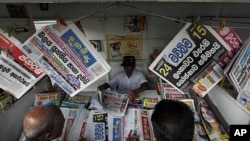Sri Lanka's government is expressing disappointment over India's backing of a United Nations resolution calling on Sri Lanka to further investigate allegations of war crimes during its civil war. Reactions in India are mixed, with some viewing the move as a geopolitical blunder.
The resolution, which calls on Sri Lanka to further investigate allegations that its military committed war crimes in the final months of its decades-long civil war against Tamil separatist militants, was adopted Thursday by the United Nations Human Rights Council in a 24-15 vote.
Sri Lanka's Foreign Minister, G.L. Peiris, called the vote a “distressing.. cynical negation” of the purposes of the U.N. rights council. He said the measure passed not because of its merits, but because of “strategic alliances and domestic political issues.”
Indian Prime Minister Manmohan Singh faced enormous pressure from Tamil political partners to depart from its historical support of Colombo and support the measure. He says India backed the measure not to infringe on Sri Lanka's sovereignty, but “so that Tamil people can get justice.”
Subramanian Swamy, president of India's Janata party, has been one of the most vocal critics of the move. He says India has reduced its clout among regional neighbors, virtually all of whom opposed the resolution.
"It puts us out of the leadership position in this region. We are basically allowing China to further strengthen itself in this area," he said. "Our larger interests in playing a role in Asia and against China have been considerably weakened."
Paikiasothy Saravanamuttu, executive director of the Center for Policy Alternatives in Colombo, says both countries are downplaying any notion of a rupture in relations, and says there is not much real anger among Sri Lankans at India.
"I think there are some who feel, well, you can't really trust the Indians, but [there is] no real anger in terms of anti-Indian tirades or anything like that," he said.
Saravanamuttu views the passage of the resolution as a positive step, because it will force Sri Lanka to more clearly address issues of post-war reconciliation.
"The resolution was needed to serve as some sort of catalyst, to serve as some sort of push, to get the Sri Lankan government on these tracks," he said.
Indian critics of the U.N. measure say it sets a precedent for future country-specific resolutions that could embarrass India - for example, on its alleged human rights abuses in Kashmir or in insurgent northeastern areas.
Meenakshi Ganguly, South Asia director at Human Rights Watch, says the gravity of Sri Lanka's rights violations merit international scrutiny in a way that India does not.
"The truth is that India has not really locked civilians in a place and started shelling the hell out of them in order to end the battle," she said. "India's not declared an area to be a safe zone and told its civilians to gather there and then shelled those, including hospitals and schools."
Sumit Ganguly, a professor of political science and India specialist at Indiana University, sees India's alignment with other democracies on human rights issues as a natural feature of its emergence as a world power.
"One of the roles the great powers have to play in the global order is to assume responsibilities, to become a responsible stakeholder in the international system, to be able to bear certain kinds of burdens and pay certain kinds of costs," he said. "And this is something that India will have to confront as it moves forward."
Thursday's resolution could add momentum to the campaign by human rights advocates for an independent international inquiry into Sri Lanka's actions at the end of its civil war - something a U.N. expert panel recommended in its report last year.
News
India's Vote in UN Against Sri Lanka Draws Mixed Reactions
- By Kurt Achin





